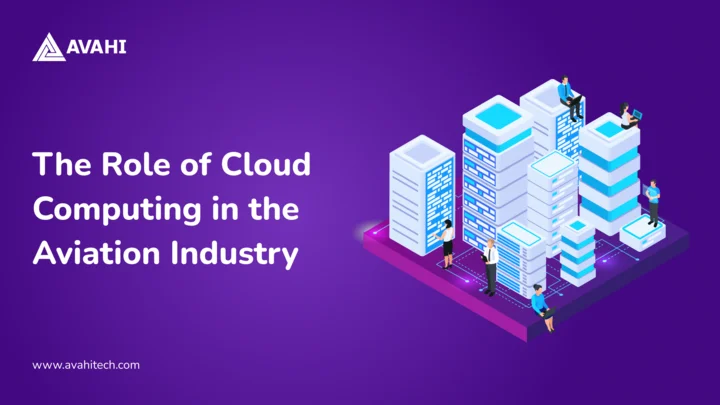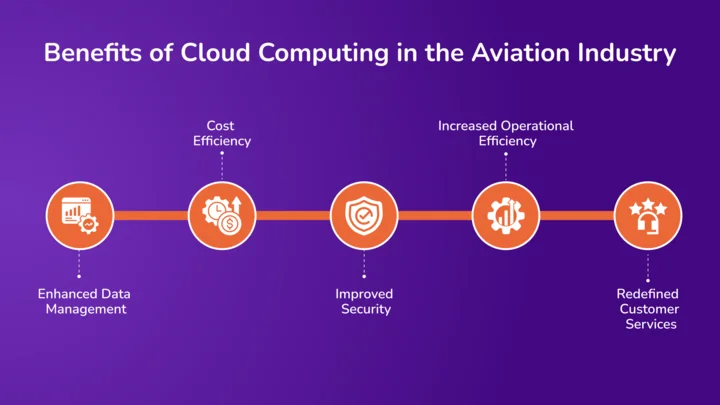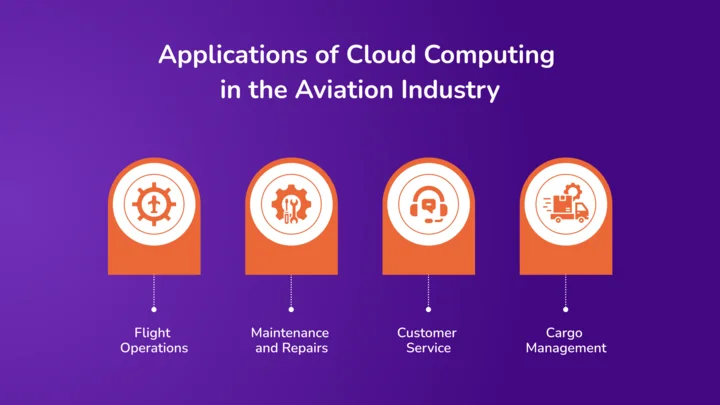It was just another Friday in July 2024 when something unexpected happened in aviation. A routine software update from the cybersecurity firm CrowdStrike didn’t go as planned, leading to significant airline disruptions. Running on Microsoft Windows, airlines worldwide suddenly faced the dreaded “Blue Screen of Death.” By the time the weekend wrapped up, nearly 10,000 flights had been canceled, and many more had been delayed.
This incident is just a starting point as we explore how cloud computing impacts aviation. It’s not only about the issues; it’s about how quickly and effectively the industry can respond and improve. Let us explore the role of cloud computing in the aviation industry, making it smarter and more connected, even when challenges arise.
Understanding Cloud Computing Fundamentals in Aviation
Cloud computing refers to the delivery of various services through the Internet. These resources include tools and applications like data storage, servers, databases, networking, and software. Cloud storage allows them to be saved to a remote database rather than keeping files on a proprietary hard drive or local storage device. As long as an electronic device can access the web, it can access the data and the software programs to run it.
Main Models of Cloud Computing
Cloud computing is often deployed in three primary models, each offering different levels of control, flexibility, and management. Understanding these models helps select the right services according to the aviation industry’s needs.
| Model | Definition | Use Case in Aviation |
| IaaS (Infrastructure as a Service) | Provides basic infrastructure services such as physical or virtual servers, storage, and networking. Users can run any operating systems or applications they need without maintaining the hardware. | Used by airlines and airports for additional storage solutions during high data influx periods like holiday seasons or special events. |
| PaaS (Platform as a Service) | Offers hardware and software tools over the internet, typically those needed for application development. A PaaS provider hosts the hardware and software on its infrastructure. | Useful for aviation software developers creating customized applications for flight operations, ticketing systems, or customer service enhancements. |
| SaaS (Software as a Service) | Delivers software applications over the internet on a subscription basis. It is managed from a central location, and users do not have to handle maintenance or updates. | Employed for CRM systems, booking engines, and flight scheduling applications that require minimal input from the user side while providing cloud-based access. |
Benefits of Cloud Computing in the Aviation Industry
Cloud computing is transforming the aviation industry by enhancing efficiency, reducing costs, and improving service delivery. Here’s a closer look at the specific benefits it offers:
Enhanced Data Management
Cloud computing provides scalable storage options and powerful data analytics tools, crucial for managing the vast amounts of data generated by the aviation industry.
Airlines generate and accumulate massive amounts of data from passenger information, flight operations, and cargo handling. Cloud services offer flexible storage solutions that can expand as data needs grow without the need for physical infrastructure investments.
With cloud computing, airlines can analyze data in real time, enabling them to make informed decisions quickly. This capability is vital for optimizing flight routes, improving fuel efficiency, and enhancing customer service by anticipating passenger needs based on historical data.
Cost Efficiency
Adopting cloud computing significantly reduces several costs associated with conventional IT setups. Using cloud services, airlines can avoid the high costs of purchasing, maintaining, and upgrading on-premise servers and other hardware. This shift reduces capital expenditure and the space and energy used to house and cool physical servers.
Cloud providers manage the backend infrastructure, reducing the need for extensive in-house IT teams. This can lead to savings on salaries and training costs.
Improved Security
Cloud providers invest heavily in security, offering strong protections that can be more effective than those implemented by individual airlines. Cloud services are equipped with security measures such as encryption, intrusion detection, and multi-factor authentication, which help protect sensitive data.
Cloud providers ensure their services comply with aviation-specific regulations, including data protection laws. This compliance is critical for airlines that operate under strict regulatory oversight.
Increased Operational Efficiency
Cloud platforms enable seamless communication and data sharing among airline staff, ground control, maintenance crews, and external partners. This integration helps in synchronizing operations, from flight scheduling to emergency management.
Cloud infrastructure allows airlines to quickly roll out new applications and services across locations without needing physical installations. For instance, updates to booking applications can be pushed universally in real-time, ensuring that all agents and customers have immediate access to the latest features.
Redefined Customer Services
Cloud technology is pivotal in improving the passenger experience from booking to boarding.
Cloud computing facilitates automated check-ins, label-printed baggage drop-offs, and self-boarding gates. These services streamline the passenger experience, reduce wait times, and improve overall satisfaction.
With cloud computing, all passenger data is stored centrally and securely, accessible by airline staff at any service point. This accessibility improves service delivery and enhances security screening processes.
Applications of Cloud Computing in the Aviation Industry
In the aviation sector, cloud technology is utilized across various departments, from flight operations to customer service, significantly enhancing efficiency and customer satisfaction. Let us explore some of the primary applications of cloud computing in aviation:
Flight Operations
Flight operations cover many activities, including flight planning, weather forecasting, and route optimization. Cloud computing facilitates these operations by providing real-time data and high computational power.
- Flight Planning: Cloud-based systems allow for the integration of real-time aviation data, including weather updates, aircraft performance data, and airspace restrictions, enabling more accurate and efficient flight planning. For instance, airlines like Delta use cloud computing to adjust real-time flight plans, reducing fuel consumption and delays.
- Weather Forecasting: By utilizing cloud services, airlines can access sophisticated weather forecasting tools that accurately predict weather patterns over longer periods. This capability is crucial for planning safe and timely routes.
- Route Optimization: Cloud platforms can process vast amounts of data from various sources to suggest the most efficient routes. This saves time and reduces fuel costs and emissions, a priority for U.S. carriers under increasing regulatory pressure to reduce their environmental impact.
Maintenance and Repairs
Aviation maintenance and repair operations are critical for safety and efficiency. Cloud computing aids these operations by enabling predictive maintenance and streamlining management systems.
- Predictive Maintenance: Cloud-based predictive analytics tools can analyze data from aircraft sensors to predict potential maintenance issues before they occur. For example, United Airlines utilizes cloud technology to monitor its aircraft engines in real-time, predicting failures before they happen and significantly reducing unplanned downtime.
- Management Systems: Cloud services provide a unified platform for managing all maintenance tasks, from scheduling to execution and record-keeping, enhancing operational efficiency and compliance with safety regulations.
Customer Service
Enhancing the passenger experience is an important goal for any airline. Cloud computing supports improved customer service through advanced CRM systems and personalized passenger interaction.
- Booking Systems: Cloud-based booking systems offer customers seamless service across multiple devices, allowing easy flight bookings, changes, and cancellations. American Airlines, for instance, employs a cloud-based reservation system that simplifies these processes and enhances customer satisfaction.
- CRM Systems: These systems help airlines manage customer data, preferences, and history, enabling personalized service. Southwest Airlines uses cloud-based CRM to provide a tailored experience, increasing customer loyalty.
- Personalized Customer Experiences: Airlines can use data stored on cloud servers to offer personalized travel recommendations, targeted promotions, and timely updates, improving the overall travel experience.
Cargo Management
Cargo management involves coordinating logistics to transport goods efficiently. Cloud solutions facilitate the real-time tracking and management of cargo, enhancing reliability and efficiency.
- Cargo Tracking: Cloud-based applications allow real-time cargo tracking, providing updates on location, temperature, and handling events, which is crucial for sensitive shipments. FedEx, for example, uses cloud technology to track cargo across its supply chain, ensuring timely and safe delivery.
- Logistics Optimization: Cloud platforms analyze historical data and real-time inputs to optimize cargo loading, routing, and unloading, thus improving operational efficiency and reducing costs
Examples of Cloud Computing in the Manufacturing Industry
Here are real examples and case studies showing how cloud computing has helped the aviation industry to streamline operations and foster innovation.
I. FAA’s Cloud Computing Initiative
In 2015, the Federal Aviation Administration (FAA) launched a major digital transformation by investing $108 million in a 10-year cloud services contract. This move aimed to streamline FAA operations and drive innovation.
Using cloud-based data management, the FAA now handles and analyzes vast data from aircraft and ground sources, creating a more data-driven National Airspace System. The FAA also holds an annual “Data Challenge” that encourages young innovators to use cloud tech in new ways, like a Duke University team’s project that used AI to reduce airport taxi times and congestion.
II. SmartSky Networks and GE Aviation’s Cloud-Based Flight Management
SmartSky Networks, in collaboration with GE Aviation and Mosaic ATM, has developed an advanced cloud-based flight management system (FMS) called True-Course. This system represents a leap forward in using cloud technology to improve air traffic control
and flight operations.
This system uses digital-twin technology to create a virtual model of flight operations, helping align different ground-based systems. True-Course’s modular setup allows GE to adapt the system for various aircraft, including drones, saving costs and increasing flexibility. By leveraging cloud computing, True-Course improves flight planning and data accuracy, particularly during complex events like mass cancellations, ensuring clear communication and efficient adjustments.
Why Choose an AWS Consulting Partner for Cloud Transformation?
Selecting the right AWS consulting partner can make all the difference in a successful cloud transformation, especially for industries like financial services that require precision, compliance, and security.
- Expert Knowledge: AWS partners understand AWS storage, computing, and AI/ML tools. They design cloud setups to fit your needs, boosting performance and cutting costs.
- Best Practices: They use the AWS Well-Architected Framework to ensure your cloud setup is secure, reliable, and meets industry standards.
- Cost Management: AWS partners help manage cloud expenses by adjusting resources, identifying savings, and using cost-effective options like reserved instances.
- Security and Compliance: They ensure your cloud setup meets strict security standards and complies with regulations like GDPR and PCI-DSS.
- Simplified Migration: AWS partners guide you through moving applications to the cloud, using tools like the AWS Migration Acceleration Program (MAP) to make the process faster and easier.
As an AWS partner, Avahi provides tailored support for financial operations, ensuring a secure and scalable cloud setup. With expertise in cost optimization, application modernization, and compliance, Avahi simplifies your cloud journey, allowing your business to focus on growth and innovation.
Leverage Avahi’s AWS Expertise for Seamless Cloud Transformation
Avahi specializes in delivering innovative cloud solutions that address your unique business challenges. As your dedicated AWS Cloud Consulting Partner, we are committed to simplifying your cloud journey through seamless adoption, migration, and application modernization.
Our Services Include:
- Adoption and Migration: Migrate your legacy applications or workloads to AWS for enhanced reliability, scalability, and performance.
- DevOps: Unlock the power of your data with advanced analytics and machine learning capabilities.
- Cloud Staffing Services: Access top-tier talent to support and drive your initiatives, ensuring a seamless and effective cloud transformation.
Want to explore how Avahi can help you simplify, modernize, and excel in your cloud journey?






